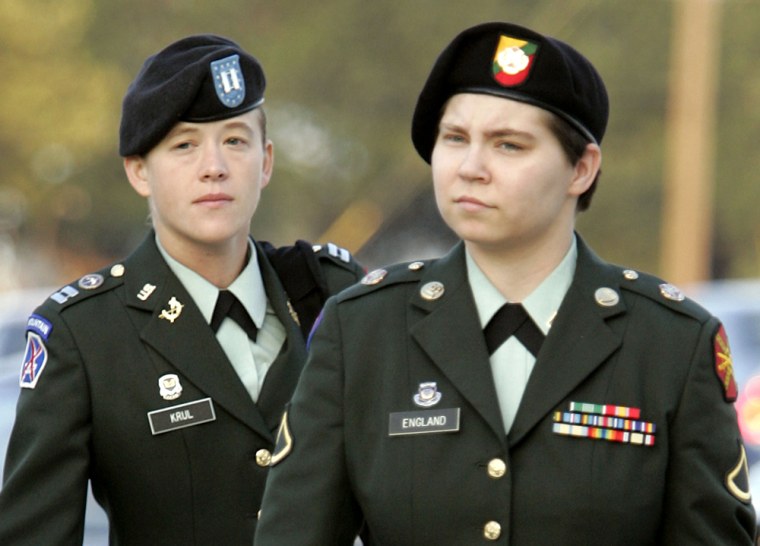Two former guards convicted in the Abu Ghraib prison scandal testified at Army Pfc. Lynndie England’s military trial Thursday that England was impressionable and under the sway of her soldier boyfriend, whom prosecutors have labeled the ringleader of detainee abuse.
Robert Jones, now a policeman in Baltimore, and Pvt. Ivan Frederick said the dominant presence of Pvt. Charles Graner trumped military rank to make him the de facto leader of the prison section where the abuse occurred.
Graner surrounded himself with people with weaker personalities, including England, Jones said. Graner also testified Thursday, saying England trusted him.
But another convicted former guard, Pvt. Jeremy Sivits, said England appeared to enjoy one incident in 2003 in which prisoners were stripped, forced to masturbate and stacked in a pyramid. She was laughing, he said.
“She seemed to be having a good time,” Sivits said.
Symbol of Abu Ghraib abuse
England, 22, became the most recognizable of the Abu Ghraib soldiers when the photos of naked prisoners on leashes and in other demeaning poses became public. She is charged with seven counts of conspiracy and abuse that carry a maximum sentence of 11 years in prison.
Jones and Frederick were called as prosecution witnesses, but their testimony may help the defense as it tries to convince a jury of five Army officers that England was trying to please Graner when she posed for the photos.
Prosecutors maintain that her smiles and thumbs-up in the photos show she was a willing participant in the abuse.
Frederick said England was naive and completely devoted to Graner, who was convicted in January and was sentenced to 10 years in prison.
“Did she do everything he asked?” Capt. Jonathan Crisp, lead defense lawyer, asked during cross-examination.
“Pretty much, yes,” replied Frederick, a former staff sergeant.
Graner, who testified for the defense, said England was generally compliant and trusted him. She had no reason to believe he would do anything “illegal or inappropriate,” he said. England has said Graner fathered her son while they were deployed.
Frederick outranked Graner at Abu Ghraib, but he said he was afraid of Graner’s temper and didn’t try to tell him what to do.
“I didn’t want no conflict,” said Frederick, who is serving an eight-year sentence. “I didn’t want to die that way.”
Defendant quizzed about photos
Thursday’s witnesses also included an Army criminal investigator who questioned England about the photos.
Sgt. 1st Class Warren Worth said he followed normal procedure but did not take extra steps to make sure she understood her rights against self-incrimination.
During that questioning, England implicated herself in the abuse. Worth said he believed she knew what she was doing when she agreed to answer his questions.
But England’s attorneys contend otherwise. They say she has learning disabilities that make it hard for her to comprehend complex language, such as legal documents.
The prosecution built its case largely on the photos of England and testimony from several of the eight soldiers previously convicted.
